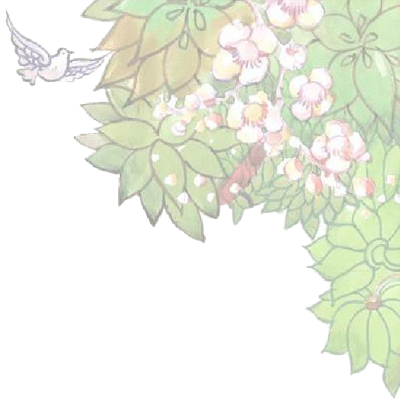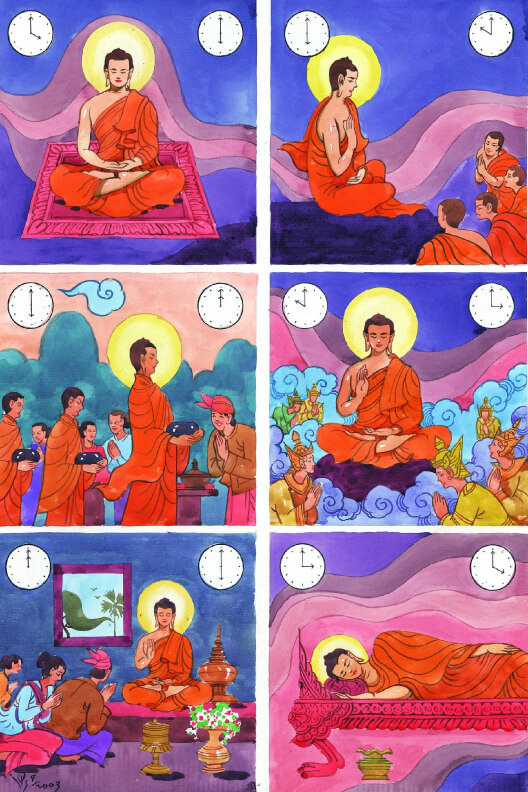44話 ブッダの一日 ・・・・ 定例の時間割

第4部 ブッダをめぐる人々
第3章 ブッダの一日
44話 ブッダの一日 ・・・・ 定例の時間割

正自覚者として、ブッダは涅槃の至福にひたったまま生きることもできた。にもかかわらず、ブッダはそのようにされなかった。実のところ、身体的な必要に応じて行うこと以外は、一日中ずっと、伝道布教活動に忙殺されたのである。
ブッダの出現は、生きとし生けるものすべてへの幸福のためであった。
(Buddholoke samuppanno hitāya sabbapāṇinaṃ).
ブッダは、無私無欲で世界の道徳向上のため、献身的に、活動された。生きとし生けるものを啓蒙するため、ブッダは最善の努力をされ、生の病から解放された。世尊の偉大なる思いやり(大悲)は、世尊の定例の日課によって知ること、見ることができる。このように世尊が地球上に生存したすべての宗教指導者中、もっとも精力的で、活動的であった、といっても過言ではないのである。
世尊がされた定例の日課は、以下の五時限に分割できる。
(1)午前の日課(食前の作務(プレーバッタ キッチャ))
(2)午後の日課(食後の作務(パッチャーバッタ キッチャ))
(3)夜のはじめの日課(初夜の作務(プリマヤーマ キッチャ))
(4)真夜中の日課(中夜の作務(マッジマヤーマ キッチャ))
(5)夜のおわりの日課(後夜の作務(パッチマヤーマ キッチャ))
午前の日課(食前の作務):6:00午前-12:00正午
世尊はいつも早朝に起きられた。涅槃の至福にひたられた後、ブッダの眼(仏眼(ブッダチャック))で世界を見渡され、助けられる者を見つけ出された。このように、托鉢に出かけられるまでの後夜を、夜の静けさのなかで過ごされた。そのときが来れば、下衣をととのえ、腰帯を締め、上衣をまとい、托鉢の鉢をもって、いちばん近い村へ托鉢に出かけられた。ときにはひとりで、ときには弟子を連れて、托鉢に回られた。
もし世尊が篤信者の自宅での布施食に招待されていないのなら、手に托鉢の鉢をもって、いつもは徒歩で、静かに通りを行かれた。視線は下向きの伏し目で、つねに気づきをもって両手を伸ばし、曲げ、托鉢の鉢の蓋を開けられるときも、布施食を受け取られるときも、すべての動作に、いつでも気づきをもってされた。回られる家々の正面玄関にひっそり立たれ、ひとことも発されず、どんな物音も立てられなかった。布施に提供され、鉢に入れられる、どんな食べ物も受け入れられた。それから、食べ物を十分に受け取られたとき、僧院へ戻り、それを食べられた。
世尊はときどき神通力を使って行かれた。たとえば高慢な結髪行者のウルヴェーラ・カッサパを打ち負かしたり、獰猛なアーラワカ夜叉をおとなしくさせたり、悪名高い殺人鬼のアングリマーラを改心させたり、蛇王ナンドーパナンダを手なずけたり、されたときである。そのほかの場合、托鉢に行かれて、智慧をもちいることで正しい道にみちびかれた。たとえばバラモンの耕田(カシ)バーラドヴァージャやシンガーラ青年に対して、それが起きた。そのほかのときには、世話することさえされた。たとえば、プーティガッタ・ティッサ(悪臭身のティッサ)に対して、それが起きた。(訳注:ティッサ尊者は全身にはれものができ、膿みで衣が汚れ、悪臭がしたが、世尊は世話された。57話参照)
世尊は昼前に食事を終えられ、短い法話をされた。聴衆のなかには、三帰依を確立する者、五戒を確立する者もいて、解脱への道を確立する者までいた。世尊はときには、僧団に入りたい者に具足戒を授けられた。このように多くの者たちの利益に寄与された後、席を立たれ、僧院に戻られた。戻られるなり、張り出したパヴィリオンに世尊のために用意された特別席に坐られ、食事から戻ってくる弟子たちを待っておられた。比丘のすべてが到着すると、世尊は香房へ向かわれるのであった。
午後の日課(食後の作務):12:00正午-18:00午後
朝の務めをすまされて、世尊は香房の近くに坐られ、足を洗われた。それから足載せ台の上に坐られ、比丘たちに、次のように熱く訓戒された。
「比丘たちよ、解脱めざして不放逸に精進しなさい。この世にブッダが出現することは、まれなのです。人の身を享けることは、まれなのです。最適の支援状態を得ることは、まれなのです。出家にまで至ることは、まれなのです。真実の教え(ダンマ)を聴ける機会は、まれなのです」
比丘のうち何人かが、実践の進捗を妨げる問題について質問した。世尊はかれらの質問に答え、そしてまたそれぞれの機根に合った適切な冥想の主題を与えられた。その後すぐ、すべての比丘は尊師に礼拝し、午後を過ごすため、各自の居場所にさがった。
これに引きつづいて、世尊みずからも休まれるため、自室にさがられた。もし、世尊が望まれるなら、右側を下にした獅子(ライオン)の寝姿で、気づき(正念)と正知をもち、横になられた。さもなければ大悲定(マハー カルナー サマーパッティ)の至福に到達された。この到達によって、世尊は世界をブッダの眼(仏眼)で見渡された。特に、比丘の弟子たちには、必要な精神的な助言を与えられた。
それから夕方にかけて、世尊や弟子たちが托鉢に回ったとき頼っている町や村の人たちが、説法をする講堂へ来るのだった。かれらは世尊に献げる花や、ほかの供物を持ってきた。世尊が説法されるとき、さまざまな人たちからなる聴衆のめいめいが、これは特別に自分に教えてくださったものだ、と考えたのである。このように、その時と場合にふさわしい法話をされるやりかたが、世尊の流儀であった。世尊の卓越した教理は、大衆にも知識人にも、その両方にひとしく受けた。
夜のはじめの日課(初夜の作務):18:00午後-22:00午後
在家の篤信者が家に帰ったあと、世尊は席を立たれ、水浴びのために侍者の比丘が水をもってきたところへ行かれた。水浴びをすまされて、世尊は着衣され、しばらく自室で、ひとりで過ごされた。
その一方では、比丘たちがそれぞれの立ち寄り先から戻ってきて、世尊に礼拝するために集まった。このあいだ、比丘たちは世尊に近寄って、疑問を正し、わかりづらい真理を質問し、ふさわしい冥想対象の教示を得て、教えを聴いた。
真夜中の日課(中夜の作務):22:00午後-02:00午前
真夜中である中夜になると、比丘はすべて世尊に礼拝したあと、去って行った。この時間は、神々や梵天など一万世界からの天人たちだけのために確保されていた。たとえば「吉祥経(マンガラ スッタ)」(小部・スッタニパータ第2章4)や「敗北経(パラーバヴァ スッタ)」(同第1章6)などの説法は、この中夜の間に行われたのである。かれらは世尊に近づいて、前もって熟考しておいた真理について質問した。世尊は中夜すべてを、かれらの問題や混乱を解決することで過ごされた。
夜のおわりの日課(後夜の作務):02:00午前-06:00午前
後夜は、世尊ご自身だけのためにあり、それは四つのパートに分かれていた。
最初のパートは午前2時から3時で、ゆっくり歩いて行ったり来たりする歩く冥想(経行)をして過ごされた。夜明け以来、坐った姿勢をとりつづけて張りつめた身体をほぐすためである。これは、世尊には、穏やかな軽い運動となった。
二番目のパートは午前3時から4時。香房で、身体の右側を下にして、気づきをもって寝られた。
午前4時から5時までの三番目のパートの間に起きて、足を組まれ、涅槃の至福にひたられながら阿羅漢果定(アラハッタパラサマーパッティ)の境地に没入された。
最後のパートは午前5時から6時であった。世尊は大悲定(マハー カルナー サマーパッティ)の至福に到達され、生きとし生けるものへの慈悲喜捨の念を放射されて、かれらの心を和らげた。この早朝の時間帯に、世界をブッダの眼(仏眼)で探索され、世尊が何かしてあげられる者を見つけ出された。世尊の助けが必要な者は、はるか遠くの向こうにいても、世尊の目の前にいるかのように世尊には鮮明に見えたのだ。かれらへの思いやりから、世尊はそこへ行かれ、必要な精神的援助をほどこされたのである。
このように、シッダッタ王子が三十五歳でブッダになられて以来、世尊は、あらゆる生きとし生けるものの幸福と利益のために、伝道布教の務めをたゆまず果たされた。丸一日中ずっと、他者の利益となって役に立つ活動に従事された。一日に眠られる時間は、わずか一時間であった。世尊は、八十歳で亡くなられるまで、四十五年に及ぶ伝道布教の日々を通じて、このようなやりかたで過ごされたのである。
※ 画像やテキストの無断使用はご遠慮ください。/ All rights reserved.

Episode 44 THE BUDDHA’S DAILY ROUTINE
As a Fully-Enlightened One, the Buddha could live by experiencing the bliss of Nibbāna alone. Nevertheless, He did not live this way. In fact, He would be occupied with religious activities for the whole day, except when He was attending to His physical needs. The appearance of the Buddha is for the welfare of all living beings
(Buddho loke samuppanno hitāya sabbapāṇinaṁ). He selflessly gave His service for the moral upliftment of the world. He endeavoured His best to enlighten others and liberate them from the ills of life. The great compassion of the Blessed One can be known and seen clearly in His daily routine. Thus, it is not exaggerating to claim that the Blessed One is the most energetic and active of all religious teachers who ever lived on earth.
The daily duties, which the Blessed One performed, can be divided into five sessions, namely (1) the forenoon duty (purebhatta kicca), (2) the afternoon duty (pacchābhatta kicca), (3) the first-watch-of-the-night duty (purimayāma kicca), (4) the middle-watch-of-the-night duty (majjhimayāma kicca), and (5) the last-watch-of-the-night duty (pacchimayāma kicca).
The Forenoon Duty: 06:00 a.m.—12:00 noon
The Blessed One always rose early in the morning; after experiencing Nibbānic bliss, He would survey the world with His Buddha Eye to see whom He could help. Thus, He passed the last watch of the night in quietude till the time of going on alms-round. Then when the time came, He adjusted His lower robe, fastened His girdle, donned His upper robe, took His alms-bowl, and proceeded to the nearest village
for collecting alms-food—sometimes alone, at other times accompanied by His disciples.
If the Blessed One was not invited to partake of a meal by lay devotees at their homes, He would usually go on foot gently through the streets with the alms-bowl in His hands; His eyes were downcast; He was ever mindful in stretching or bending His arms; so was it when He opened the cover of His alms-bowl and received alms; ever mindful was He in all His movements. He would stand silently in front of the door of each house, without uttering a word or making any noise. He would collect whatever food was offered and placed in His alms-bowl. Then, when He had accepted enough food, He would return to the monastery to partake of the meal.
The Blessed One sometimes went by His psychic powers, such as to defeat the haughty matted-hair ascetic Uruvela Kassapa, to pacify the ferocious Yakkha Āḷavaka, to convert the notorious murderer Aṅgulimāla, or to tame the nāga king Nandopananda. On other occasions, on His way of going on alms-round, He would lead some people to the right path by using His wisdom—such as what happened to the brahmin Kasi Bhāradvāja and the youth Siṅgālaka—and at other times, He would even look after some people—such as what happened to the Venerable Pūtigatta Tissa.
Having finished His meal before midday, the Blessed One would deliver a short discourse; He would establish some listeners in the Triple Refuge, some in the Five Precepts, yet some others in the paths to deliverance. He would sometimes grant ordination to one who wished to join the Order. After benefiting the multitude in this way, He would rise from His seat and return to the monastery. Upon His return, He
would sit down in the pavilion in a special seat prepared just for Him; He would wait for His disciples, who would return after their meal. When all the bhikkhus had arrived, the Blessed One would then go forth towards His Fragrant Chamber.
The Afternoon Duty: 12:00 noon—18:00 p.m.
With the morning duty completed, the Blessed One would take a seat near His Fragrant Chamber and wash His feet. Then, getting up on a footstool, He would exhort the bhikkhus: “Bhikkhus, strive for your deliverance with diligence. Rare is the appearance of a Buddha in the world, rare is the acquisition of the human state, rare is the gain of optimal supporting conditions, rare is the going-forth into homelessness, rare is the opportunity of hearing the true Dhamma.”
Some bhikkhus would then ask questions about their problems which hindered the progress of their practice. The Blessed One would answer their questions and also would give suitable subjects of meditation appropriate for their particular temperaments. Thereupon, all the bhikkhus would pay homage to the Master and retire to their individual quarters to spend the afternoon.
Following this, the Blessed One Himself would retire to His own chamber to rest. If He so desired, He would lie down for a few moments on His right side, in the lion posture, mindful and clearly comprehending; otherwise, He would attain the bliss of Boundless Compassion (Mahā Karuṇā Samāpatti). By this attainment, He would survey the world with His Buddha Eye; He would especially give spiritual advice to His bhikkhu disciples as necessary.
Then, towards the evening, the residents of the city and villages where the Blessed One and His Disciples depended on alms would come to the preaching hall; they would carry flowers and other offerings to Him and waited to listen to His discourse. When the Blessed One preached the Dhamma, each member of the audience, though differently constituted, thought that the Blessed One’s sermon was directed in particular to him. Such was the Blessed One’s method of expounding the
Dhamma, which was appropriate to the time and circumstances. The sublime Teachings of the Blessed One appealed to both the masses and the intelligentsia alike.
The First-Watch-of-the-Night Duty: 18:00 p.m.—22:00 p.m.
After the lay devotees returned home, the Blessed One rose from His seat and went to the place where the attendant bhikkhu had fetched some water for His bathing. And after taking a bath, the Blessed One donned His robe well and stayed in solitude in His chamber for a moment.
Meanwhile, bhikkhus would come from their respective resorts and assembled to pay obeisance to the Blessed One. During this time, the bhikkhus were free to approach the Blessed One to get their doubts cleared, to question Him on the intricacies of the Dhamma, to obtain suitable objects of meditation, and to hear His Teachings.
The Middle-Watch-of-the-Night Duty: 22:00 p.m.—02:00 a.m.
When the middle watch of the night arrived, all the bhikkhus would have departed after paying homage to the Blessed One. This time would be exclusively reserved for celestial beings such as devas and brahmās from ten thousand world systems. Some discourses, such as the Maṅgala Sutta and the Parābhava Sutta, were expounded to them during this middle watch of the night. They approached the Blessed One to inquire Him on the Dhamma which they had previously pondered. The Blessed One spent the whole midnight by solving all their problems and perplexities.
The Last Watch of the Night Duty: 02:00 a.m.—06:00 a.m.
The last watch of the night was exclusively for the Blessed One Himself. It was divided into four parts. The first part was from 2 to 3 a.m. It was spent by Him for pacing up and down (caṅkamana) in order to ease His body that had been strained by His sitting posture since dawn. This serves as a mild physical exercise to Him. The second part was from 3 to 4 a.m. He mindfully slept on His right side in the Fragrant Chamber. During the third part, that is from 4 to 5 a.m. He rose from lying, sat cross-legged, and absorbed in the state of Arahatta Phala Samāpatti experiencing the bliss of Nibbāna.
The last part was one full hour from 5 to 6 a.m. The Blessed One attained the bliss of Boundless Compassion (Mahā Karuṇā Samāpatti) and radiated thoughts of loving-kindness towards all beings and softened their hearts. At this early hour, He surveyed the whole world with His Buddha Eye (Buddhacakkhu) to find out individuals to whom He could render any service. Those who needed His help appeared vividly before Him, though they might live at a remote distance. Out of compassion
for them, He would go and render the necessary spiritual assistance.
Thus, since Prince Siddhattha became the Buddha at His age of thirty-five, He was tirelessly performing religious duties for the good and happiness of all living beings. The whole day, He was fully occupied with the beneficial activities for others and He slept only for one hour per day. He had been spending His days throughout the
forty-five years of His ministry in such a way until His passing away at the age of eighty.
※ 画像やテキストの無断使用はご遠慮ください。/ All rights reserved.
アシン・クサラダンマ長老
1966年11月21日、インドネシア中部のジャワ州テマングン生まれ。中国系インドネシア人。テマングンは近くに3000メートル級の山々が聳え、山々に囲まれた小さな町。世界遺産のボロブドゥール寺院やディエン高原など観光地にも2,3時間で行ける比較的涼しい土地という。インドネシア・バンドゥンのパラヤンガン大学経済学部(経営学専攻)卒業後、首都ジャカルタのプラセトエイヤ・モレヤ経済ビジネス・スクールで財政学を修め、修士号を取得して卒業後、2年弱、民間企業勤務。1998年インドネシア・テーラワーダ(上座)仏教サンガで沙弥出家し、見習い僧に。詳しく見る
奥田 昭則
1949年徳島県生まれ。日本テーラワーダ仏教協会会員。東京大学仏文科卒。毎日新聞記者として奈良、広島、神戸の各支局、大阪本社の社会部、学芸部、神戸支局編集委員などを経て大阪本社編集局編集委員。1982年の1年間米国の地方紙で研修遊学。2017年ミャンマーに渡り、比丘出家。詳しく見る

※ 画像やテキストの無断使用はご遠慮ください。
All rights reserved.

